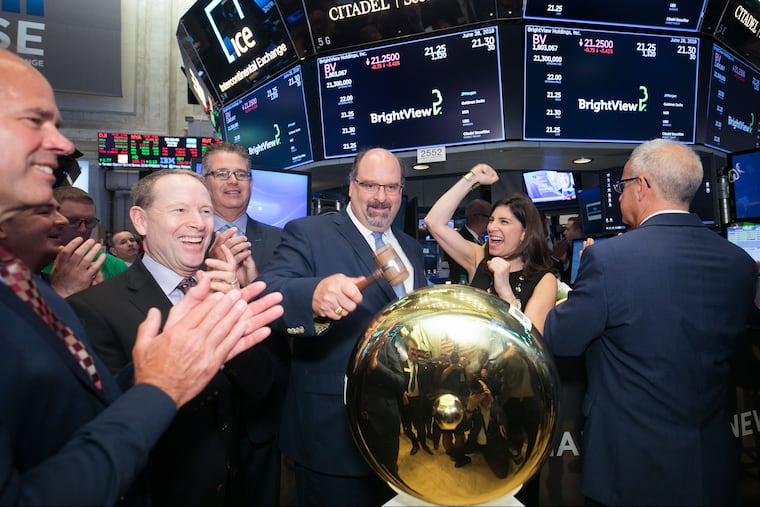Plymouth Meeting-based BrightView commercial landscaper debuts shares on the New York Stock Exchange
Bright View, Inc., based in Plymouth Meeting, had its IPO on the NYSE on June 28.

BrightView Holdings Inc., which calls itself "the largest provider of commercial landscaping services in the U.S.," debuted its shares on the New York Stock Exchange on Thursday even as it faces increased challenges involving immigration.
The company is heavily in debt — $1.6 billion as of March 31, in part because of the big mergers that created the firm — and it lost $2.7 million in the first half of 2018, compared with a $53 million loss in the same period in 2017, records show. But those losses are narrowing as revenues rose by nearly 11 percent this year, said CEO Andrew Masterman. BrightView employs 19,000 people around the country, including 475 in the Philadelphia region.
"As a landscaping economy, whether the economy is booming or the economy is in a recession, the grass still grows," Masterman said. "We're a pretty steady-Eddie company. … We find ourselves well positioned, we're growing in that upper quartile at above-industry rates."
But BrightView also faces challenges involving immigration.
As a landscaping company, BrightView employs many seasonal workers and non-citizens. BrightView is the nation's largest employer of workers entering the U.S. under the H-2B visa program for legal guest workers for seasonal businesses, the company said. As with many landscaping companies, this raises concerns about workers potentially being in the U.S. illegally. BrightView touts its use of the U.S. Department of Homeland Security's E-Verify system, citing its "self-imposed requirement that 100 percent of new employees be verified using the system."
"The political environment is not friendly to immigration right now," Masterman said. "We are a huge, huge supporter of permanent and seasonal visa and immigration in this country. By not having that and not having a friendly environment around immigration right now, frankly, that impacts us."
In January 2017, the returning worker exemption to the H-2B visa program folded, meaning that, even if workers had secured a visa in past years and had, like many BrightView employees, been "coming back for 10 or 20 years for six or seven months a year," they still had to enter the lottery for a non-guaranteed visa.
"It was a big hit. there's no question about it," Masterman said. "We've found people to replace them. It's just, they aren't as talented."
"We could grow faster and hire more American jobs if we had the guest worker program expanded," he added. "It doesn't even need to grow, just to what it used to be."
At its height, 8 percent of BrightView's workers were on H-2B visas. Now, with the end of the returning workers exemption, Masterman says that only about 3 percent of its workforce is comprised of seasonal workers.
A May 2018 report on the landscaping industry from IBIS puts the total industry revenue at $87.8 billion. The report estimated that BrightView is the biggest player in the market with a 2.6 percent market share, which leaves a lot of room for consolidation and growth.
Investment management company KKR & Co. L.P., owns 75.8 percent of BrightView pre–IPO, and MSD Partners owns 17.7 percent. KKR bought Brickman for $1.6 billion in 2013; it bought a majority stake in ValleyCrest in 2014 and merged them into one national company under the name of BrightView, solidifying some market power in a fragmented industry.